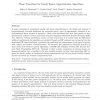Free Online Productivity Tools
i2Speak
i2Symbol
i2OCR
iTex2Img
iWeb2Print
iWeb2Shot
i2Type
iPdf2Split
iPdf2Merge
i2Bopomofo
i2Arabic
i2Style
i2Image
i2PDF
iLatex2Rtf
Sci2ools
110
Voted
CORR
2010
Springer
2010
Springer
Phase Transitions for Greedy Sparse Approximation Algorithms
A major enterprise in compressed sensing and sparse approximation is the design and analysis of computationally tractable algorithms for recovering sparse, exact or approximate, solutions of underdetermined linear systems of equations. Many such algorithms have now been proven to have optimal-order uniform recovery guarantees using the ubiquitous Restricted Isometry Property (RIP) [11]. However, without specifying a matrix, or class of matrices, it is unclear when the RIP-based sufficient conditions on the algorithm are satisfied. Bounds on RIP constants can be inserted into the algorithms RIP based conditions, translating the conditions into requirements on the signal's sparsity level, length, and number of measurements. We illustrate this approach for Gaussian matrices on three of the state-of-the-art greedy algorithms: CoSaMP [29], Subspace Pursuit (SP) [13] and Iterative Hard Thresholding (IHT) [8]. Designed to allow a direct comparison of existing theory, our framework impli...
Related Content
| Added | 09 Dec 2010 |
| Updated | 09 Dec 2010 |
| Type | Journal |
| Year | 2010 |
| Where | CORR |
| Authors | Jeffrey D. Blanchard, Coralia Cartis, Jared Tanner, Andrew Thompson |
Comments (0)

